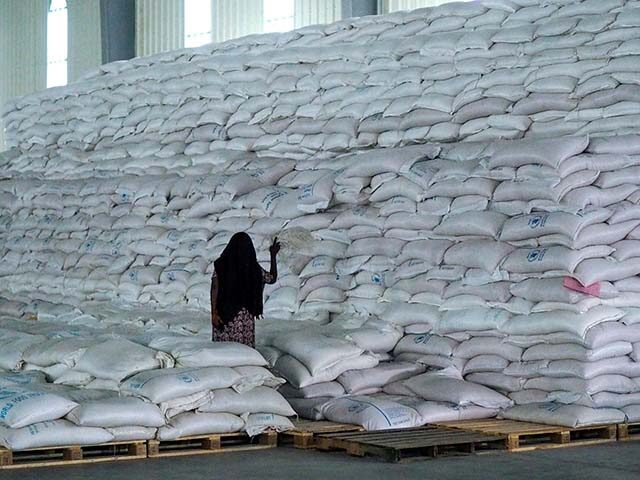The international aid news outlet the New Humanitarian reported on Monday that the top World Food Program (WFP) officials in Ethiopia resigned last week following an investigation into the disappearance of critical food aid in that country, believed to later resurface on the black market.
The WFP, a Nobel Peace Prize-winning United Nations agency, announced in early May that it would no longer attempt to bring food aid to northern Tigray, Ethiopia, as a result of the mass disappearance of the food. Tigray endured two years of a brutal blockade by the Ethiopian government during the civil war that began in November 2020, a government attempt to deprive the Marxist Tigray People’s Liberation Front (TPLF) of supplies it could use to fight Addis Ababa. The war’s hostilities, which expanded in 2022 to include Eritrean forces fighting alongside the government, have largely culminated this year through a ceasefire agreement. Local reports suggest the Ethiopian government is no longer blockading Tigray, but unspecified criminals regularly steal international humanitarian aid to sell for profit.
“WFP is very concerned about the large-scale sale of food in some markets [which] poses not only a reputational risk but also threatens our capacity to mobilize more resources for the needy people,” the head of the WFP’s Ethiopia operations, Claude Jibidar, reportedly wrote in a letter to humanitarian partners of the WFP on the ground in April. Jibidar reportedly called it “imperative that immediate actions be taken to curb … the misappropriation and diversion of humanitarian food.”
A month later, the WFP announced it would no longer offer aid to Ethiopia “until WFP can ensure that vital aid will reach its intended recipients.” USAID, America’s humanitarian agency, similarly suspended operations in the same week.
“Recently, however, USAID uncovered that food aid, intended for the people of Tigray suffering under famine-like conditions, was being diverted and sold on the local market,” a statement from the agency read. “This diversion has dealt yet another blow to innocent civilians suffering needlessly due to the recent conflict in northern Ethiopia, where millions of people are experiencing acute food insecurity.”
The suspension of aid prompted widespread protests in Ethiopia, particularly among displaced Tigrayans now deprived of, often, their only sources of food and medicine.
“It has been eight months since we received humanitarian aid, and we are dying because of that,” one protester, Melakeselam Kiros, told the Addis Standard in late May. “We are protesting to raise our voices demanding the resumption of suspended aid.”
The Associated Press reported at the time that local aid workers in Tigray said thieves had ransacked storage warehouses and the stolen aid “included enough food for 100,000 people.”
“It was not clear who was responsible for stealing the aid from the Sheraro warehouse, which was previously looted by Eritrean soldiers allied to Ethiopia’s federal government in a separate incident. One of the aid workers said it was supplied by USAID and due to be distributed by partners,” the Associated Press reported at the time.
Tigrayan officials attempted to convince the WFP and USAID not to suspend operations shortly after their announcements, nonetheless admitting “the gravity of the problem.”
“In light of the gravity of the problem and mounting evidence on the ground, we have launched a high-level investigation to ensure that all culprits are held to account whatever their background or status”, Getachew Reda, interim president of Tigray and a TPLF leader, urged. Tigrayan officials appeared to confirm government assertions that Ethiopian officials were not blocking the entry of food into the region.
According to the New Humanitarian, citing anonymous WFP sources, Jibidar, the Ethiopia director, and deputy Jennifer Bitonde resigned from their positions on Friday. The outlet specified that its reporting did not clarify if their departure was a direct result of the food theft, but occurred shortly before the WFP concluded an investigation into what happened with its supplies in Tigray.
“The move followed an internal investigation launched last month over reports that significant amounts of food meant for hungry people in Ethiopia’s war-affected northern Tigray region had been sold on the commercial market,” the New Humanitarian reported. “More resignations are expected in the coming weeks as the Ethiopian country team is overhauled, they [sources] told The New Humanitarian, again speaking on condition of anonymity.”
The TPLF, the opposition fighting force in the Ethiopian war, was the ruling party of the country prior to the administration of current Prime Minister Abiy Ahmed, also a Nobel Peace Prize winner. Abiy, an ethnic Oromo, launched a full-scale war on the TPLF that included the blockade of Tigray following a TPLF attack on an army base in November 2020. Human rights groups and United Nations leaders accused Ethiopian troops of committing atrocities against Tigrayan civilians, massacring families in their homes and, most prominently, starving them through the Tigray blockade.
“For more than 21 months the six million people of Tigray have been under a suffocating siege that has killed people, not only with bullets or bombs but by weaponising banking, fuel, food, electricity and healthcare,” Tedros Adhanom Ghebreyesus, the head of the World Health Organization (W.H.O.) and a TPLF member, said in August 2022, later accusing the government of killing his uncle.
Reports out of conflict areas also accused TPLF fighters of atrocities against civilians, particularly mass murder and rape of ethnic Amharic people caught between the TPLF and the government.
“Tigrayan fighters killed 27 civilian men in the town. … Townspeople said more than 70 women were raped by Tigrayan fighters,” Reuters reported from the Amharic town of Belete Asrate in late December 2021.

COMMENTS
Please let us know if you're having issues with commenting.